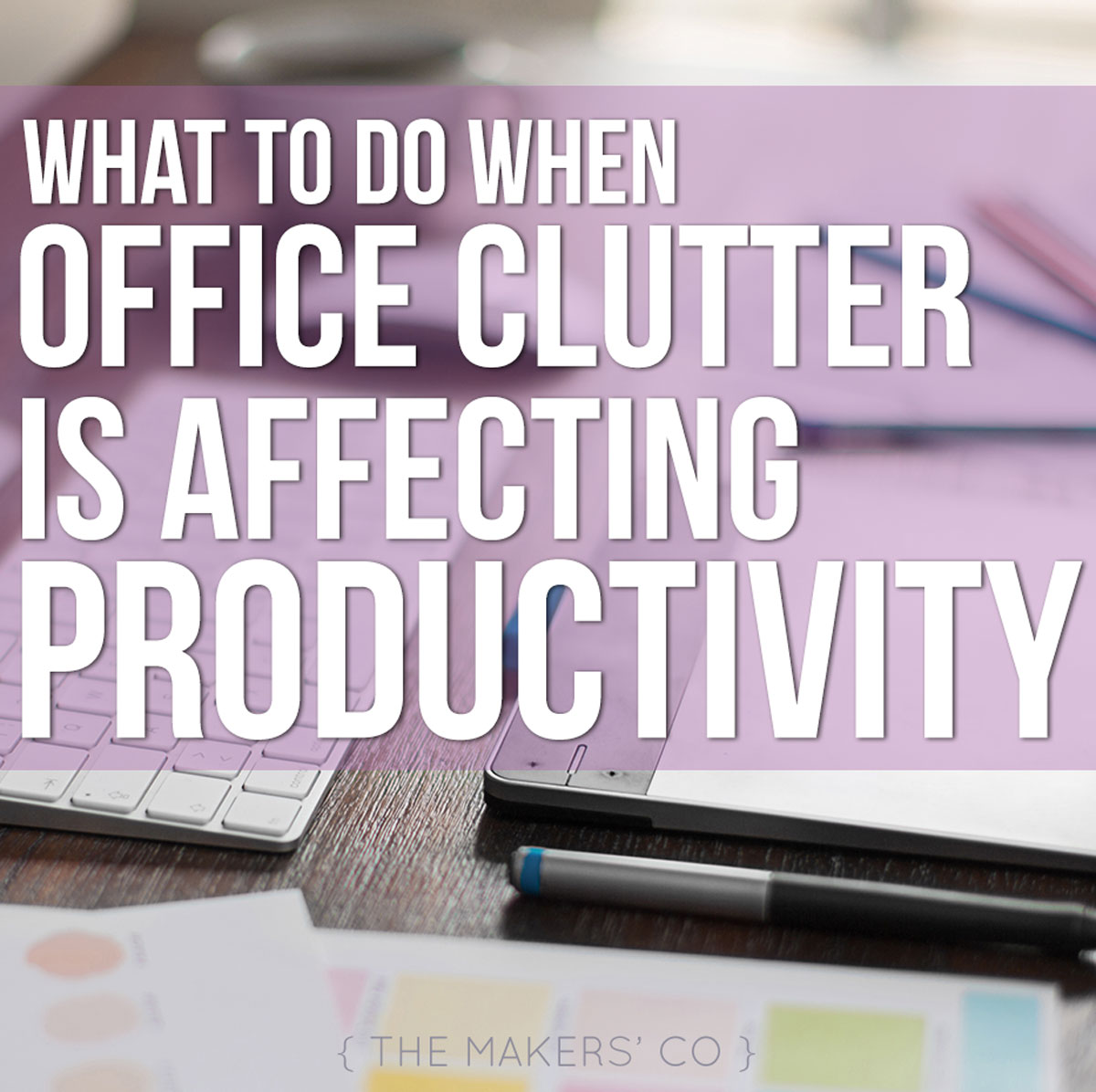We all have different tolerance levels for clutter. This applies equally to clutter in our homes and clutter in our work spaces. For some, a desk covered in papers, coffee cups and photo frames is just another day at the office. For others, it is a paralysis inducing disaster making them unable to function in the midst of all the mess. They feel as if they cannot breathe and have difficulty deciding what to work on as every item is calling for their immediate attention.
Whether you relate to the first, the last or are somewhere in between, office clutter is having a negative influence on your productivity.

Loss of productivity due to lack of space
Picture a desk covered in papers, files and half finished projects. Then imagine you are about to begin work. You need to move things around in order to find a space on the desk to begin the task. You squeeze your work in and then in the middle of the project are inexplicably unable to locate an important piece of paper you were just working on. It’s become caught up in a tangle of other papers and you can’t find it anywhere.
Now picture a nice clear work space with plenty of room to spread out. Everything you need to complete the project is within arms reach and you know exactly where to find it. Nothing gets misplaced and you spend all of your time on productive work.
When we have too many items on the desk, it is easy to find ourselves wasting time wrestling for space or hunting for something we need. That time would be far better spent actually working on the task and our stress levels will be much lower as a result.
Physical clutter in our surroundings competes for our attention
Having all of our unfinished tasks sitting on our desk is a bad idea for another reason. Piles of papers and files sitting on the desk in front of us or, in extreme cases even cluttering up the floor, attract our attention. They are a constant reminder of all of the work still left undone and distract from the work we are currently doing. They can make us feel guilty about working on one project while we leave another.
Unfortunately, feeling guilty about tasks left undone will not help us to finish them any sooner. In fact, we often try to solve this problem by jumping from one task to another in order to feel as if we are achieving something and end up compounding the problem. You see, it can take the brain up to twenty minutes to switch focus from one task to another. If we do this many times per day we lose a huge amount of productive work time. It means that it will actually take longer to finish the tasks than if we had simply focused on one until it was complete before beginning the next.

So once you have decided you need to tidy up your work space, how do you go about it?
Step 1) Tidy all surfaces.
The first place to start is to remove the clutter from the most obvious areas of the office. Objects are usually the easiest to begin with. This includes things like pens, coffee cups and photo frames. Be ruthless and only keep what is absolutely necessary.
Step 2) Create folders or files for loose papers.
Paper can be more difficult to manage than other items. It’s usually sitting around for the simple reason that it needs some of your time and attention before you can put it away. Initially, I suggest simply bundling it all up and putting it into a folder. Once the major clean up has been finished, you can go back to those papers and begin to sort them out into topics or themes.
Putting all of the appropriate pieces of a project together will make it much easier to put your hands on the right things when you begin to tackle that task. Don’t forget to label the outside and then file it on the bookshelf or in a cabinet. Don’t worry that not having it out on your desk will mean that you will forget to work on it. Here’s where your diary or planner comes into its own. Write down each task to be completed in your diary or planner and then put the physical reminder out of sight for now.
Step 3) Go through drawers and cupboards, tossing old papers, pens and bits and pieces no longer needed.
Once the surfaces are sorted out, it’s time to tackle the hidden spots. It’s amazing how much we can accumulate that is not needed and will never be used again. Get stuck into those areas next and make space for the important items you need to tuck away out of sight.

Finding the time to declutter
I realise that everyone is busy and you may find yourself wondering how you will find the time to do these things. The work day can be hectic enough from beginning to end and just keeping on top of the urgent tasks can be difficult without adding an extra one to the day. Truth be told however, if you are like most of us, you will never find the time. It’s just not there to be found. What you need to do is to make the time instead.
Begin by spending just 15 minutes per day on the task. You may choose to do this at the beginning of the day (my recommendation) or at the end. Whichever you choose, ensure it gets done by setting an alert to remind yourself to do it. Don’t go home until it has been done.
Take it in small steps the first time you try. Don’t get too excited and empty everything out of the filing cabinet. Begin with just one drawer and even then maybe just one file in that drawer. Small steps will get you further than an all out mammoth decluttering session. These tend to make us so mentally exhausted that we never do them again. This means that we stop before we are finished or only do it the once and find ourselves in as big a mess in a few months time as we were before we began.
Once you have got things to a reasonable level of neatness, the important thing to do is to keep it that way. Spend five minutes at the end of every work day sorting, filing and tidying and you will always be on top of things. Give yourself the gift of a neat and tidy office when you walk in to work tomorrow and improve your productivity from the outset. You may just find that you will create a little bit of extra time to tackle one of those other tasks waiting for you.


Jen Robinson
Guest Blogger
Jen Robinson is a mother, teacher and blogger who writes for busy women who want to streamline their work, nurture their families and reconnect with their passions. She lives on a small rural block in Western Australia with her husband, two children and far too many animals. Jen currently has a free decluttering worksheet available for readers at http://buff.ly/1qiMtVp.
